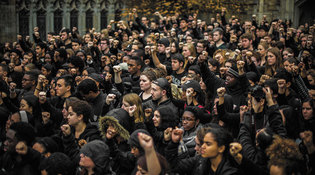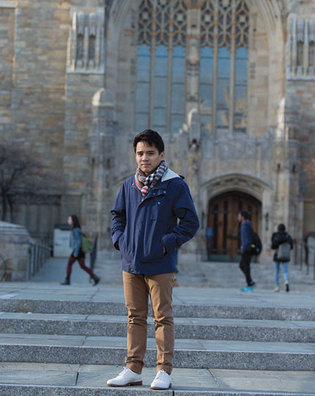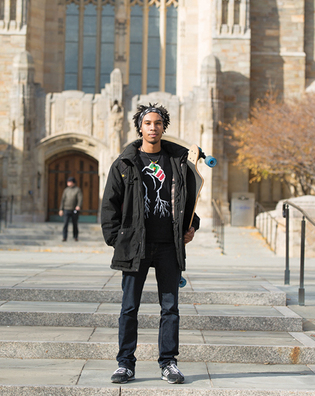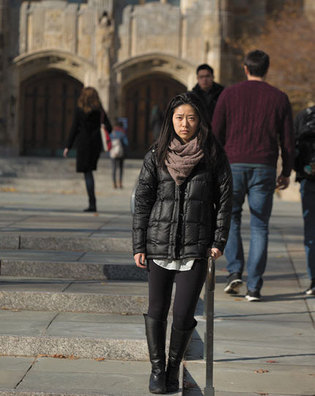 loading
loading
featuresOf color, at YaleThe media focused on student anger. We asked where the anger came from. Nick Chiles ’86 is a Pulitzer Prize–winning journalist and two-time New York Times bestselling author. Lily Engbith ’17 provided reporting.  Philipp ArndtView full imageWhat do we take away from our time at Yale? While the degree brings its share of prestige, I believe the true essence of a Yale education comes from thousands of unique and shiny moments, bursting with significance, strung together over the course of four years. Bright college years, filled with light and truth. But for students of color, those moments often include much darkness: too many painful instances of differential treatment based on race; moments of casual racism received like punches to the gut, silently absorbed but never forgotten. When my son and I recently compared our undergraduate experiences—he graduated from Lafayette in Pennsylvania—I told him that most African Americans I’ve encountered who spend considerable time in any predominantly white institution walk away with a certain amount of ambivalence toward the place. The occasions of joy will likely be tempered by the memories of frustration and pain. That edifying semester I spent at Yale studying with an exhilarating professor also included frequent and unnerving trips across the campus when I left the Yale Daily News late at night—with a campus police car following closely behind me, making sure I wasn’t a criminal. Some might say that such experiences in college served to prepare me for the real world, for a lifetime of racial strife and struggle. In that way, perhaps college was only doing its job. But I can’t help but think that it didn’t have to be this way, to wonder how sublime my time in New Haven would have been without the insult. I yearned to experience, if only for four years, the lightness of the white majority, breathing the purified air of a place where I mattered just as much as everybody else. As the years passed, it was tempting for me to imagine that the Yale experiences of black, Latino, and Asian students were now free of the slights I experienced in New Haven 30 years ago. But conversations with current students revealed that the instances of casual racism, what some call microaggressions, are still there, delivering the same wincing jolts and jabs.  Mark OstowJan-Alfred Aquino ’17 View full image Mark OstowRyan Wilson ’17 View full image Mark OstowNatalie Sheng ’17 View full imageRyan Wilson, an African American junior from Philadelphia, recalls an incident during his freshman year that started innocently enough: a white female friend asked if she could borrow a pair of his gym shorts. Then he discovered why she needed them. “She was going to a ‘gangsta’-themed party that her sports team was throwing, and so she borrowed my basketball shorts to use for her costume,” he said. “She came back and showed me pictures from the party and was like, ‘Look, we braided our hair.’ It was horrifying.” Rather than remaining silent, Wilson wrote about the experience in the Yale Daily News. He says he thinks back to the gangsta-themed party every time there’s an explosive racial incident. “When they shot Tamir Rice, a little 12-year-old boy, all I could think of was that when [my friend’s friends] dressed up as ‘gangstas,’ they dressed up as black children,” says Wilson. “Of course [the Cleveland police] shot him. It’s just really scary to see these little stereotypes that Yale students act on every day being used to kill people.” Olivia Bedford, a senior from Bothell, Washington, whose mother is white and father is black, actually had a white friend suggest to her during her freshman year that it was because of Olivia’s “white blood” that she was so competent and intelligent. “It was something that she very clearly thought to be true. That was the one time when I very specifically called her out, because it was so unfathomable,” Bedford says. “She tried to backtrack, but made no real effort to dismantle that belief.” Bedford says she prefers the term “casual racism” over “microaggressions” to describe these hurtful encounters. “Casual racism,” she says, “describes the fact that these are racist beliefs that people hold but that they don’t even perceive as racist. So when they make these comments, they’re often completely casual or unintentional. In most cases they don’t even realize what they’re saying because they haven’t been taught to think about these things. So I think the biggest problem is a lack of education. And that’s also probably why you can be friends with someone who says these hurtful things and still remain friends with them.” For black and Latino students, the accusation often flung their way, in many different guises, is that their presence on campus is due to their race, not their accomplishments or intellect. A sophomore from Rwanda (who asked to remain anonymous) noted how a white classmate reacted when he discovered she had been admitted to a very selective high school program at Yale—a program that had rejected him. “He said, ‘Well, you know, it’s different. You’re African. It’s not the same thing,’” she recalled. “At that moment I saw how he could think I was exempt from the selectivity, how I was not included in his idea of the program.” Natalie Sheng, a junior from Novi, Michigan, who is Chinese American, is an art history major. She has been frustrated by the stereotypes she consistently encounters at Yale about the science subjects that are supposed to interest Asians. “After I declared my major [in art history], people would ask one of my best friends—who’s wealthier, white European, and also an art history major—and me what we were studying. And when she replied, the reaction was always ‘Oh, that’s so cool! What made you want to do that? Who’s your favorite artist?’ They would actually engage her in conversation about the major,” she says. “But when they asked me and I said the same thing, they’d be like, ‘Oh, really?’ and then make this facial expression that clearly read, ‘That doesn’t make sense.’” Jan-Alfred Aquino, a junior from Bayonne, New Jersey, who is Filipino American, says there is currently a phrase being used on campus that illustrates how the dismissal of Asians has been normalized: “That’s so Asian.” “I hate how on campus ‘Asian’ has become a description for things that aren’t your race,” he said. “The phrase ‘That’s so Asian’—what does that even mean? It doesn’t make any sense. We are literally the majority of the world. What kind of stereotypes are you even trying to reference?” For generations, students of color at Yale have mostly endured these slights and slams with silence, believing it was part of the tacit contract they had signed: admission into the ranks of the elite came with its share of pain. But as demonstrated by the turmoil recently roiling the campus, this generation appears to be more willing to talk about the slights, to tell Yale about its imperfections. They are pushing for a new contract.
|
|
3 comments
-

William Fonvielle, 1:09pm January 11 2016 |  Flag as inappropriate
Flag as inappropriate
-

Louis CK, 12:43am January 18 2016 |  Flag as inappropriate
Flag as inappropriate
-

Bruce Harnett , 11:26pm January 25 2016 |  Flag as inappropriate
Flag as inappropriate
The comment period has expired.I know my daughter, Trumbull '95, encountered microagression while at Yale, but because of her ambiguous physical appearance it typically took the form "what are you" as if it was their business to know. My daughter hated this. My much younger son (not a Yalie) actually relishes those moments as it gives him opportunities to display his wit. I am much less ambiguous in appearance--clearly African-American--but my time at Yale SOM ('79-'81) seemed a welcomed respite from racism in all it forms. At 35 and with a family I was not at all a typical student. Having grown up in the forties and fifties, and having led two activist civil rights organizations, I was anything but naïve. Yet I cannot recall any negative experiences of a racial nature except during recruiting season when some interviewers were obvious bigots. Nevertheless, I had my pick of both job and intern opportunities. I felt I enjoyed the universal respect of the faculty and administration, and majority respect of my fellow students. My academic record was spotless and I was a TA for two professors in completely different disciplines. I had job offers at graduation from two Yale professors who had consulting businesses. I also served as a student member of the Admissions Committee. Off campus life was equally peaceful. Having seen a campus posting for a part-time consulting engagement with a major New Haven based company, I applied and was hired at the interview. I was also campus sales rep for American Express. Why am I saying all of this? I'm not sure other than that it struck me to respond in this manner. Maybe I was just monumentally lucky at Yale.
I was a minority student at Yale and have to say I'm astounded by two of the examples of "racism". Natalie Sheng who is frustrated by cognitive dissonance that she isn't a math or science major. Really? Sounds more like lack of conversational skills than microaggression. Re Ryan Wilson's shorts being commandeered for a gangsta theme party: It's not like such parties don't happen for real. Ryan's retaliation should have been to borrow his friend's pink cords and pearl necklace and have a preppie theme white party.
The example used as retaliation does not juxtapose equally offensive scenarios. These scenarios are a little more analogous. On white Prepie frat night, all of the guys dressup as votmitous drunks and the girls as pasted out potential date rape victims. How about Mafioso night: Everyone can come dressed as Italian looking hitmen,loansharks,or murdered gangsters. You can ask your Italian friends to borrow hair gel.Lets add also that this is all taking place in a prestigious university in China. There are only a small number of white students and the majority Chinese student population can't understand why white students are so sensitive,even though these stereotypes closely reflect their true feelings about white people.